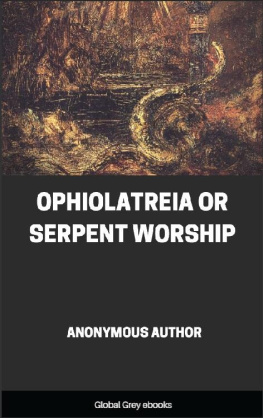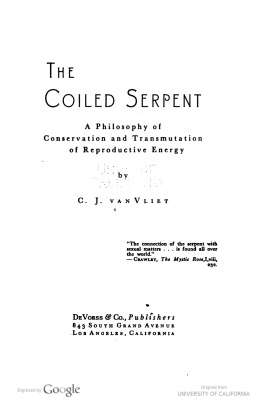Wade Davis - The Serpent and the Rainbow
Here you can read online Wade Davis - The Serpent and the Rainbow full text of the book (entire story) in english for free. Download pdf and epub, get meaning, cover and reviews about this ebook. year: 1985, publisher: Simon & Schuster, genre: History. Description of the work, (preface) as well as reviews are available. Best literature library LitArk.com created for fans of good reading and offers a wide selection of genres:
Romance novel
Science fiction
Adventure
Detective
Science
History
Home and family
Prose
Art
Politics
Computer
Non-fiction
Religion
Business
Children
Humor
Choose a favorite category and find really read worthwhile books. Enjoy immersion in the world of imagination, feel the emotions of the characters or learn something new for yourself, make an fascinating discovery.

- Book:The Serpent and the Rainbow
- Author:
- Publisher:Simon & Schuster
- Genre:
- Year:1985
- Rating:4 / 5
- Favourites:Add to favourites
- Your mark:
- 80
- 1
- 2
- 3
- 4
- 5
The Serpent and the Rainbow: summary, description and annotation
We offer to read an annotation, description, summary or preface (depends on what the author of the book "The Serpent and the Rainbow" wrote himself). If you haven't found the necessary information about the book — write in the comments, we will try to find it.
The Serpent and the Rainbow — read online for free the complete book (whole text) full work
Below is the text of the book, divided by pages. System saving the place of the last page read, allows you to conveniently read the book "The Serpent and the Rainbow" online for free, without having to search again every time where you left off. Put a bookmark, and you can go to the page where you finished reading at any time.
Font size:
Interval:
Bookmark:
Praise for The Serpent and the Rainbow
Mr. Daviss book should become a classic in the literature of scientific adventure. He reports his adventures brilliantly, conjuring up characters and settings vividly and creating sinister suspense with the skill of an accomplished novelist.
Atlantic Monthly
This first-hand account reads like inspired fiction. You cant help but sink back in your chair and gleefully drink in the incredible journey that unfolds.
Glamour
Certain to enthrall both the lay and the scientifically minded reader. He tells his incredible tale in a straightforward, highly readable manner.
Saturday Review
As engaging as any fictional spy thriller a must read for anyone fascinated by real-life adventures.
U.P.I.
The rich flavor in this strange book is like that in the early Carlos Castaneda.
People
Eloquent and dramatic [Daviss] greatest success is in revealing the world of vodoun without sacrificing the sense of wonder and mystery it evokes.
Village Voice
The book is a thriller: Davis captures the excitement of a scientist hot on the trail of an elusive compound; he explores an exotic and beautiful country with the eye of a poet; he insinuates himself into Haitis secret societies and returns to tell us about it. Its a virtuoso performance.
Baltimore Evening Sun
You might call this Indiana Jones Goes Spooking. And spooky it is.
Playboy
A powerful living cosmic view that questions and challenges the basic premises of western society and thought. A provocative look beyond the black magic cliche.
Kirkus Reviews
It is a remarkable story. I was fascinated by it.
Michael Crichton, author of Jurassic Park
It is an exciting blend of adventure, science, and mysticism.
George Schaller
Beautifully written. Wade Davis puts the search back into research and science back where it belongs in the realm of high adventure. An absorbing blend of Journey to Ixtlan and The Double Helix.
Lyall Watson
An interesting report on zombies, voodoo, and the secret societies of Haiti by an adventurous explorer of the botanical, pharmacological, and psychological mysteries of exotic cultures.
Andrew Weil, M.D., author of Spontaneous Healing
Fascinating.
Peter Mattiessen
To my parents, to Professor Richard Evans Schultes, who made it possible, and to John Lennon.
He knew the story of King Da, the incarnation of the Serpent, which is the eternal beginning, never ending, who took his pleasure mystically with a queen who was the Rainbow, patroness of the Waters and of all Bringing Forth.
A. CARPENTIER The Kingdom of This World
Everything is poison, nothing is poison.
PARACELSUS
A Note on Orthography
THE ORTHOGRAPHY of the name of the Haitian traditional religion has been the source of some academic debate. The word voodoo comes from the Fon language of Dahomey (now Benin) and Togo. It means simply god or spirit. Unfortunately, as a result of the sensational and inaccurate interpretations in the media, Hollywood in particular, the word voodoo has come to represent a fantasy of black magic and sorcery. Anthropologists have attempted both to highlight and to avoid this stereotype by using a number of terms including vodu, vodun, voudoun, and vodoun. I have followed their lead because I feel, as I hope this book will show, that the rich religion of the Haitian traditional society deserves to be recognized, and what we have come to know as voodoo bears little resemblance to it. I use the term vodoun because it seems to me to be phonetically the most accurate. However, it is important to note at the outset that the Haitian peasants themselves do not call their religion vodoun. Theirs is a closed system of belief, and in a world of few alternatives one either serves the loathe spiritsor one does not. Vodoun, from their point of view, refers to a specific event, a dance ritual during which the spirits arrive to mount and possess the believer.
For the sake of clarity, I refer throughout the book to the vodoun society. This is a concept of convenience, and it also reflects the view of an outsider looking in, not that of a believer surrounded by his spirit realm.
Likewise, the spelling of zombi is a matter of some disagreement. Websters prefers zombie, the more familiar form, to zombi. My Oxford dictionary doesnt even have the term, which reflects the American fascination with Haiti since the Occupation. The sources in the literature are mixed. Seabrook (1929) spelled it zombie, as did Deren (1953). Metraux (1972), Huxley (1966), and Leyburn (1941), on the other hand, use zombi. Metraux is perhaps the recognized authority on the religion, but to my mind Deren had more intimate contact with the people and is an important source as wellalthough this has little to do with the spelling of the term.
Of more interest is the derivation. The word probably comes from the Kongo word nzambi, which more or less means spirit of a dead person. This is yet another example of the African roots of the vodoun religion and society.
PART ONE
The Poison
1
The Jaguar
MY FIRST MEETING with the man who would send me on my quest for the Haitian zombi poison occurred on a damp miserable winters day in late February 1974. I was sitting with my roommate David in a caf on a corner of Harvard Square. David was a mountain boy from the West, one generation removed from the family cattle ranch, and just about as rough-cut and restless as Harvard could tolerate. My home was on the rain coast of British Columbia. Both of us had come East to study anthropology, but after two years we had grown tired of just reading about Indians.
A map of the world covered most of one wall of the caf, and as I huddled over a cup of coffee I noticed David staring at it intently. He glanced at me, then back at the map, then again at me, only this time with a grin that splayed his beard from ear to ear. Lifting his arm toward the map, he dropped his finger on a piece of land that cut into Hudsons Bay well beyond the Arctic Circle. I looked over at him and felt my own arm rise until it landed me in the middle of the upper Amazon.
David left Cambridge later that week and within a month had moved into an Eskimo settlement on the shore of Rankin Inlet. It would be many months before I saw him again.
For myself, having decided to go to the Amazon, there was only one man to see. Professor Richard Evans Schultes was an almost mythic figure on the campus at that time, and like many other students both within and outside the Department of Anthropology I had a respect for him that bordered on veneration. The last of the great plant explorers in the Victorian tradition, he was for us a hero in a time of few heroes, a man who, having taken a single semesters leave to collect medicinal plants in the northwest Amazon, had disappeared into the rain forest for twelve years.
Later that same afternoon, I slipped quietly onto the fourth floor of Harvards Botanical Museum. On first sight the Spartan furnishings were disappointing, the herbarium cases too ordered and neat, the secretaries matronly. Then I discovered the laboratory. Most biological labs are sterile places, forests of tubes and flashing lights with preserved specimens issuing smells that could make a fresh flower wilt. This place was extraordinary. Against one wall beside a panoply of Amazonian dance masks was a rack of blowguns and spears. In glass-covered oak cabinets were laid out elegant displays of the worlds most common narcotic plants. Bark cloth covered another wall. Scattered about the large room were plant products of every conceivable shape and formvials of essential oils, specimens of Para rubber, narcotic lianas and fish poisons, mahogany carvings, fiber mats and ropes and dozens of hand-blown glass jars with pickled fruits from the Pacific, fruits that looked like stars. Then I noticed the photographs. In one Schultes stood in a long line of Indian men, his chest decorated with intricate motifs and his gaunt frame wrapped in a grass skirt and draped in bark cloth. In another he was alone, perched like a raptor on the edge of a sandstone massif, peering into a sea of forest. A third captured him against the backdrop of a raging cataract in soiled khakis with a pistol strapped to his waist as he knelt to scrutinize a petroglyph. They were like images out of dreams, difficult to reconcile with the scholarly figure who quietly walked into the laboratory in front of me.
Font size:
Interval:
Bookmark:
Similar books «The Serpent and the Rainbow»
Look at similar books to The Serpent and the Rainbow. We have selected literature similar in name and meaning in the hope of providing readers with more options to find new, interesting, not yet read works.
Discussion, reviews of the book The Serpent and the Rainbow and just readers' own opinions. Leave your comments, write what you think about the work, its meaning or the main characters. Specify what exactly you liked and what you didn't like, and why you think so.






